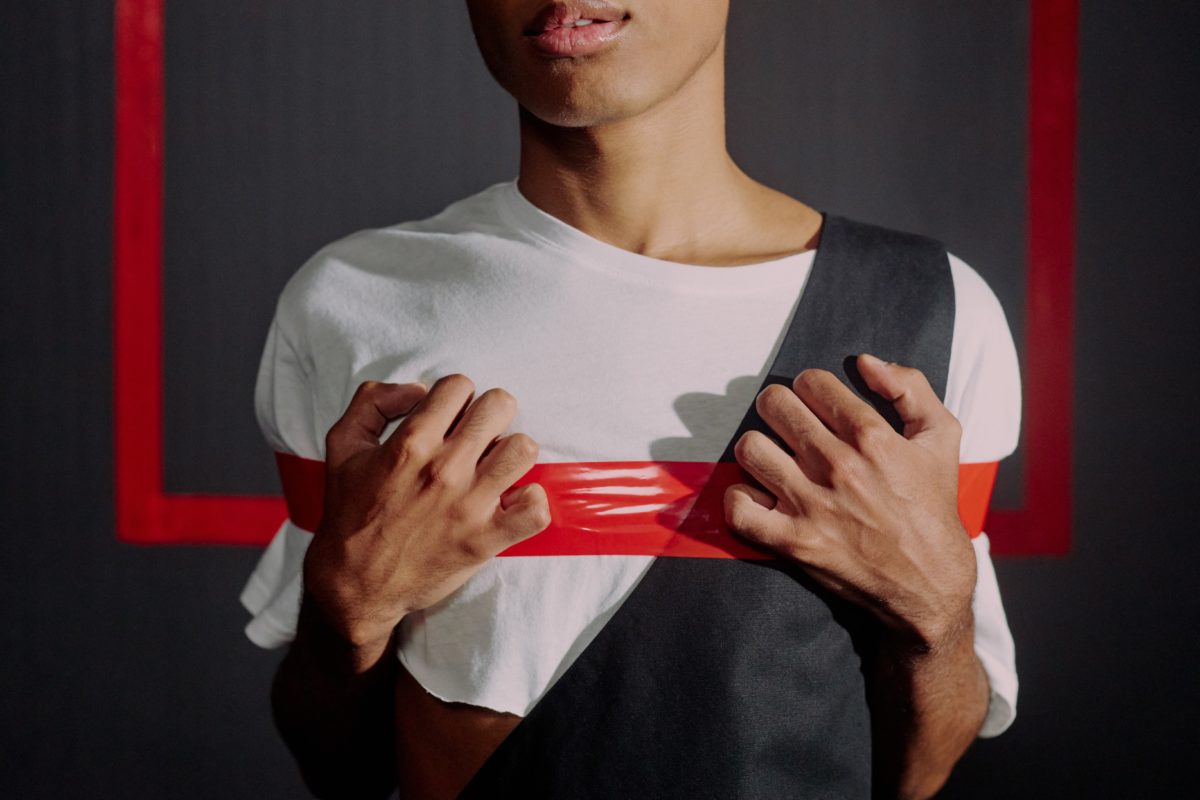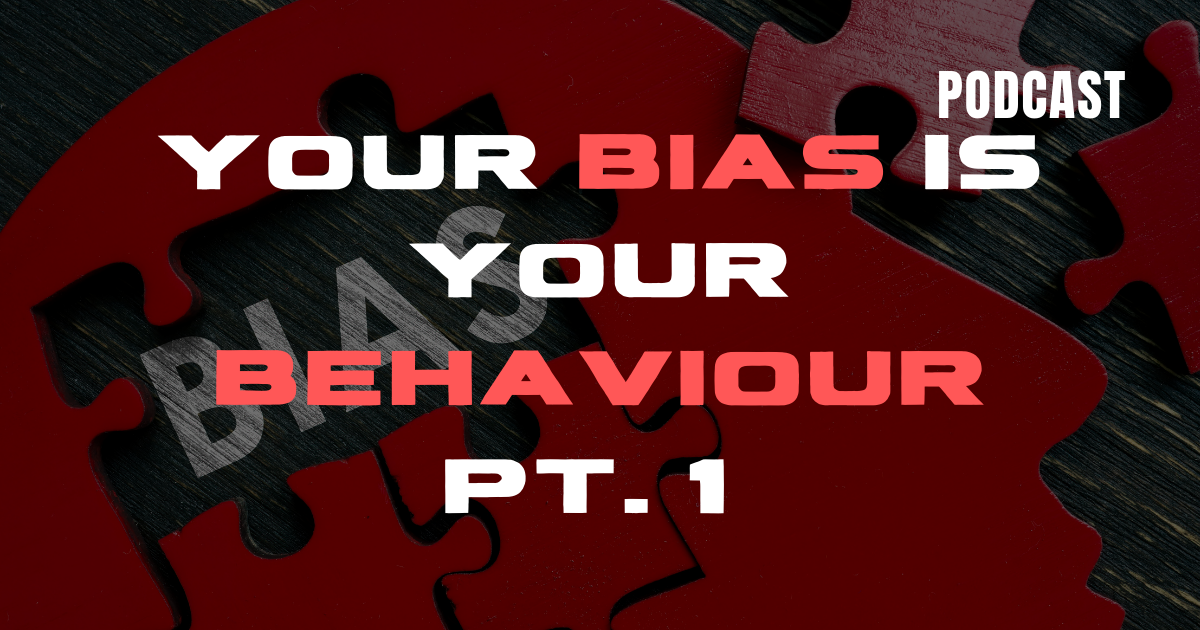“Your Bias Is Your Behaviour” Pt. 1 Brief Summary of Show:
Bias, there is certainly a lot of it out there. What is implicit bias? Why do we have implicit bias? Can we change our biases? In this 2-part Inspired Action For Imperfect Humans episode Christopher Lawrence and Kyle Kalloo discuss implicit bias, why we have it, how to recognize it, and how to take a step back and be mindful about our assumptions and biases, and understand our intent… and hang tight folks, it does get a little controversial!
Calls to Action:
Tell us your “inspired stories” stories by visiting www.InspiredActionPodcast.ca
Christopher Lawrence LinkedIn: https://www.linkedin.com/in/career-life-coach-christopher-lawrence/
Kyle Kalloo LinkedIn: https://www.linkedin.com/in/kyle-kalloo/
Change My Life Coaching & Change My Business Coaching LinkedIn: https://www.linkedin.com/company/6446498/admin/
Change My Life Coaching: https://changemylifecoaching.ca
Strategic Leader: https://strategicleader.ca
Resources:
The Association for Psychological Science: https://www.psychologicalscience.org/observer/the-bias-beneath-two-decades-of-measuring-implicit-associations
“Your Bias Is Your Behaviour” Pt. 1 Transcript:
This is my problem with where the world has moved is that there’s no room for the way the human brain works.
Exactly.
I was screamed at by somebody a couple of weeks ago because I used the wrong gender pronoun. They prefer they and them. For 41 years, I have used they and them as a plural for somebody going to,
Of course.
You know, like for people going to a place. So, it’s not in my brain, but the implicit bias that this person had was that I was being deliberate, it was a microaggression. And it’s like, but maybe it was just a mistake because,
The pattern has always been.
My brain is not trained this way yet. And so, your violent response to me actually makes me not even want to try anymore. I’ll keep trying, because that’s who I am. But in the moment I was just like, “Hey, I’m really doing my best here.”
[Announcer] Is the thought of being imperfect, keeping you from taking action? Welcome to Inspired Action for Imperfect Humans. Each week, we give you real life stories and thought-provoking research that inspires your soul to live a more fulfilled life through your own actions. From the heart of Calgary Canada. Here are your hosts, award winning coaches, Christopher Lawrence and Kyle Kalloo.
Welcome to another exciting,
Hello, hello! Oh, I thought I’d start one, Okay, go ahead then.
Let’s start that again.
I sort of feel like you had a bias that you were going to start all of our podcasts forever.
The reason why I start is because whoever is hosting that day, starts and I’m hosting this podcast. So therefore I start.
Oh, oh, okay. Oh, I see. Well that might’ve been an assumption that you made. Anyway girl, why don’t you go ahead and get us started as the hostess with the most.
I know what you guys are wondering, how do I do it? How do I work with this guy? How do I day in day out deal with this level of treatment? I know you guys are thinking,
Medication
I said that to someone the other day,
No you didn’t.

I said with meds, I can cope. It was a joke. It wasn’t about you. It was just how I’ve gone through. Cause we were going through a disc profile. Anyway, ladies and gentlemen, boys or girls, madame and monsieur, bienvenue and welcome to another exciting week of Inspired Action for Imperfect Humans like Christopher. So let’s just talk a little bit about the subject. I really wanted to talk a little about, it can be a little bit confusing, but trust us on this. Stay with me here, where you probably saw from some of the titles about what exactly is implicit bias. We’re going to get there because I want to talk about how it actually really impacts the workforce, how it impacts our relationships that we have with people and implicit bias is one of those things happening without us even knowing. That’s what’s different about it, right? So an implicit bias is an unconscious association, belief or attitude toward any social group. Now, due to implicit biases, people may often attribute certain qualities or characteristics to all members of a particular group, which leads now into stereotyping. But we’re not going to really talk about that. It’s important to remember that implicit biases operate almost entirely on an unconscious, at an unconscious level while explicit biases, which you probably hear more about and prejudices are intentional and controllable. Implicit biases are less so, and I know what you’re thinking. Some of you say, That doesn’t happen to me. I’m very mindful of my biases. And I’m telling you, this happens with, or without your help. It’s just, we need to be mindful of it. And some examples of that, I think about when I started in leadership, I was usually the youngest leader and some people without even knowing it start to treat me like, how does he know anything? What does he know? Sometimes they’ll talk down to me. Sometimes they will interact in a certain way. Sometimes they’ll be like, oh, you’re the manager? Oh, you’re the boss? Oh, and I don’t think they’re even aware of it. There are times where I’ve walked into a room, and a group of people who are probably twice my age and they’ll say, oh, excuse me, I’m sorry. This is a private meeting. We’re just waiting for, the manager or the director. And I’m like, and I would say Kyle Kalloo? And they’re like, yes. And I said, that’s me. And they’re like, oh! And again, they had a certain association in their head of what they thought it was going to be. I’m not saying they looked at the explicit side of it and say, oh, maybe all these type of groups are this. Or all men is this or all of this, this, this, that.
I’ve got a good one for you.
Why are you smiling? Tell me.
Because this reminds me, do you remember when we were dating?
The best time of your life ever? Yeah.
Months ago? The best time of my life. Hmm, I remember it differently.
With medication I remember differently.
Do you remember the first time you met my stepmom? We were going through Saskatoon. We had to stop and get a tire fixed. Cause we went to a different family members lake house, we’re coming through the city, decide we’re going to have, lunch with my dad and stepmom. but we take the car to a tire place because there’s a hole in the tire.
Yeah. I think your dad had suggested that.
Yeah,
We said we’d meet there.
We said we’d meet there. And my stepmom pulls me aside while you’re talking to my dad and dealing with getting the tire fixed. And she said, Christopher, nobody told me that Kyle was black. and, she was shocked and she had no problem with it,
No, it was just,
She had no problem with it. But her implicit bias, was she heard the name, Kyle, she had talked to you on the phone.
Right.
And she, in her own mind formed an image of what you might look like.
Exactly. And she was like, kind of, I don’t know if stunned is the right word. She was stunned. She was surprised.
She was shocked, She was surprised.
She was surprised for sure. Implicit bias. See you talk like a white man talks, that’s a bias right there.
You know, it’s interesting
I say that now I’m afraid because of the way the world is. And I’m going to be called out as a racist. But you do get this a lot. Like people do think that you talk like a white person. They’re always surprised to see.
Yeah. I don’t like you look like.
What you look like

Yeah. And so I’m not going to knock you on that. Because you’re absolutely right. And for example, what I often hear, and because you guys know, I do speaking events and I travel to different places. And sometimes, especially before when we had LinkedIn and the Google and all these other stuff, cause now people Google you before you even show up. I’m always surprised when someone’s like, oh my God, I Googled you. I looked at you and dah, dah, dah. So they know. But there are times where I’ll do a speaking engagement and I’ll speak about something and I often will hear, you know what, you’re very articulate. You know, you’re very articulate. And I would say that and I didn’t normally think of it until someone else said to me, I speak a lot too. I’ve never heard, I think I’m an articulate person, but how come I never heard that. And when I started to pay attention to it and I started to ask other people. And I said, do you ever hear that? People tell me that was a good speech, but they never say I’m articulate. I don’t think I don’t hear that often. But I think that is sometimes what happens. Is it associated with their shock? How I say it or they’re expecting me to sound a certain way. You know, sometimes that happens. Interesting enough. There is a guy that we used to work with. He was dating, and then he was married to another guy and one of them was named Tyrone Brown and the other one was John something. I don’t remember what his last name was, but it’s, it’s a very like John Wexfield or whatever. And every time people met them, cause one of them was black and one of them was white. Now, which one do you think was the white, based on the names I just gave you? What do you think some implicit bias was?
What were the names again? Tyrone Brown and John Maxfield or something like that.
Yeah, I would totally say that Tyrone Brown is the black name.
He’s the black guy, right? He is the white guy. And he says, Kyle, do you know how many times I go to places where they’re like, Tyrone, or they both go together and they always assume he is the white name. Like again, we know people have these different names,
So I’ve actually done some research on naming statistics and it is more likely than that an African-American or a black person will have a name like Tyrone.
Right.
So it is an implicit bias, but it’s an implicit bias that’s still built in by a stereotype that’s still built in by truth.
Absolutely.
And the problem that we run into is that our brains don’t understand the difference between, like truth and stereotype and implicit bias. Like we tell our own story.
Absolutely. And so what I would say to that in addition to the fact that we are influenced by our environment and stereotypes that already exists in the society, into which we were born. It is generally impossible to separate yourself from the influence of society. So when people are like, that doesn’t matter to me, I don’t see color. I don’t see these things. I think everyone is the same. Cause we hear leaders who will say that often. Everyone’s the same. I treat everyone the same and that’s sometimes a problem. We sometimes have to be mindful of who’s on my team, who’s in my circle. Let me be deliberate about how I interact with them. When I start, because we have the automatic thought of reacting to certain things. But there’s times where we have to just say, listen, let me be deliberate about my interaction, or question Why did I say that? Why did I feel that certain way? Like where did that information come from? I see this quite often Christopher, with onboarding, When we onboard, especially with someone who’s been in the industry for a long time. When we onboard them in our company, we sometimes tend to talk down to them. At least that’s what they say. That people treat me like I’m stupid.
Like we do?
No, not us.
You do, but I don’t.

No, but people who onboard people in organizations. We do that. I see situations when you speak different languages, if you don’t speak your language, people tend to dumb it down. Like, can you hear me? The one thing that really gets me when you can’t speak someone’s language and they speak it louder. I didn’t say I was deaf.
Louder and slower.
Like, I’m not deaf.
Okay, but to be fair, I think that that’s unconscious.
Absolutely
Like I don’t think it’s conscious. What I run into trouble with is that we now live in a world where every little thing like that is considered a microaggression against a minority group. And I don’t agree with that because we’re not actually asking somebody’s intent. Like you go and feel an African woman’s curls. You go to touch her hair because you like her hair. That’s considered a microaggression, a racist microaggression. And I would say, but I think you need to understand intent. Like if you know me and all of my friends do, and I have friends of every color of the rainbow, Kyle can attest to this.
You’re the united colors event
But see this is the bias, it’s like, you can’t believe me because I’m a white man. You can’t believe me. But my black friend will attest for me. And you can believe him I guess. Cause that’s the world we live in now. And it makes me a bit, but we don’t ask intent. It’s like, I have done that with black friends and it was never a microaggression and it wasn’t, it’s because their hair was beautiful, because I’m tactile, because I’m curious, and I’ve done it to white friends. I’ve done it to white friends too.
Even if you didn’t do it to white friends you still want to understand it.
And I’m not saying it’s right. It’s like, well, you shouldn’t touch anyone without their permission. That’s like, yes I agree. And yet how many times do we go? And we believe that permission is implied or implicit. And so, I’m not defending my position. What I’m saying is that we’ve moved away from asking intent and this is the issue. So I see two key issues. One, in the office place or otherwise, when we are having, when implicit bias exists, we don’t question ourselves enough to open up to another perspective. And that’s everybody, that’s all groups. And the second thing is, is that we don’t look at intent. We don’t understand why somebody said what they said or did what they did. With that said, implicit bias still exists. It exists. This is a bit of a meta analysis. Excuse me. This is a bit of a meta analysis that was put together in 2018. And it’s from an article, the Association for Psychological Science. And, it’s a cover story. They did the bias beneath. Two decades of measuring implicit association. So this is two decades worth of looking at implicit associations. And so, it exists in everything from weight, so obesity and overweightness, suicide risk, romantic attachment, attitudes about sexuality. Gender. It all still exists in all of these things. And so we do see it. We do see, and even in the testing, what they saw is that implicit bias. This is why it exists. We as human beings look for patterns, it makes our lives easier. So we seek out patterns and we take shortcuts. So cognitive biases and assumptions help us to simplify the world because our brain is just kind of like a CPU unit, It’s like a computer unit. It doesn’t actually, all it does is it takes in data and it puts data out just like a computer does, but it’s the mouse that puts data into the computer, a keyboard or a camera that puts data into the computer. And then the computer spits out on either through sound or through report or through image on the screen. It puts out data. Our brain is very much the same way and so takes shortcuts. So, this is kind of our way of filtering through all of the information that we’re constantly faced with. And this is my problem. Sorry, I gotta stop for a second. There’s one more thing here. This is my problem with where the world has moved is that there’s no room for the way the human brain works.
Exactly.
I was screamed at by somebody a couple of weeks ago because I used the wrong gender pronoun. They prefer they and them. For 41 years, I have used they and them as a plural for somebody going to,
Of course.
like for people going to a place. So it’s not in my brain, but the implicit bias that this person had was that I was being deliberate. It was a microaggression. And it’s like, but maybe it was just a mistake because,
The pattern has always been,
My brain is not trained this way yet. And so your violent response to me actually makes me not even want to try anymore. I’ll keep trying, because that’s who I am. But in the moment I was just like, “Hey, I’m really doing my best here.” And actually Kyle, the research shows over and over consistently people who had negative associations with certain genders and certain roles or certain sexualities. So LGBT people in certain roles, the research shows that when that group is associated with positive words, for some people who had previous negative associations towards LGBT group, it’s harder for their brain to make the connection of positivity. That doesn’t make them a bad person. It was just the social influence that you’re talking about. So I think people need to calm the F down here. And start to ask for intent. Start to ask for intent. I’m sorry, I take it absolutely personally. I heard this in an office once. Only white people can be racist. Girl, that is such bullshit. That is not true. That is not true at all. I have experienced racism as a white person and it’s like, no, you haven’t. And I’m like, I could tell you stories and people will argue those stories so I won’t. But that is not true. If you’re a human being who is neurotypical, you can be unconsciously racist. And that is the same thing as implicit bias. So sorry, we’re talking about three things. The first is that we seek out patterns. We take shortcuts, and our experience and social conditioning play a role. So implicit biases are influenced by experiences. Although sometimes those attitudes may not be the result of direct personal experience. It can be like cultural conditioning, media portrayals. Upbringing can contribute to implicit associations.
Yeah. And it will happen with, or without you. And that’s what we’re saying is, and for us to be mindful of it, because sometimes we could have implicit biases positively, it’s not always negative as well. And so there is a positive side of that as well.
Absolutely true.

It’s just really about being deliberate. And one of the things that we say is, as we move, when Christopher was talking about intent, it’s deliberate as well, being mindful of it versus reactionary. Even though you may not to one group, but you do to another. There’s times where people are like well you never do it to that group, so why do you want to do to that group? Again, there’s different circumstances that will dictate that. That it may be the person has never experienced that before. The environment they were brought up, there was never an opportunity. So there’s a lot of these different things. And I think sometimes it may, and when we talk about your relationship with other people, it may getting in the way of those relationships. And so what we want, what we’re suggesting today is to be mindful, be deliberate about it, slow yourself down and ask that question. Especially when you see a reaction from it, instead of going to the place of, I can’t believe they reacted that way. Just be mindful that they could have because of result of an implicit bias or explicit biases, whatever the case may be. So it’s like, when you’re taking a look at a behavior or behavior that is not desirable for you, what we’re saying is go back to it and take a look at it from an intent perspective, as well as being deliberate. So we’d like to hear any of your stories or interaction, remember to share this podcast with someone, we hope you got a lot of the valuable information, or just hearing us chat about it, because these are the types of things that we talk about not only with each other.
I think we need do another one on this. Kyle, I think we need to do a part two.
Okay
I think people would like to hear your personal experience with implicit bias and in the workplace.
Yeah. There’s a lot of stories there. Remember to download, remember to share. And again, if you’re watching us, let us know, we’re working on a community that we’re going to bring together that is going to allow us to all be in that one space that we can share and interact. Cause I would love to see the chat going back and forth of what you think about these different podcasts as we’re doing it. There’s a lot of traction to our podcasts lately. And we’re so fortunate, so glad that you guys.
So grateful for the people reaching out and commenting and letting us know, kind of what they think and what their inspired action is. So Kyle, what’s the Imperfect Inspired Action today?
Mindful. Being mindful of your actions and how does it impact other people? That is the number one thing I would say for you to think about.
[Announcer] It’s our goal to build a global community of inspired action takers. And we can only do that with your help. So if you love inspired action, please leave a review on your favorite podcasting app and share us on your socials. You’ve heard from us, now we want to hear from you. Go to inspiredactionpodcast.ca and tell us what is the inspired action you took this week. Next week on Inspired Action for Imperfect Humans.
The problem Kyle, is that people are not recognizing that we’re not all going to get on the same page.



